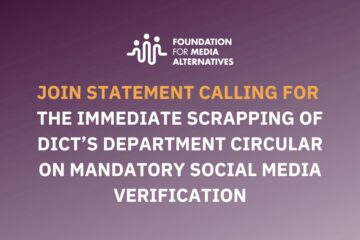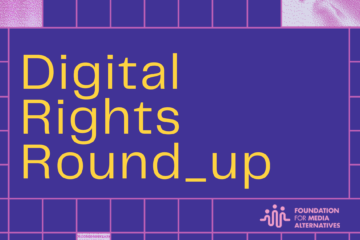The problem with ID systems that lack legal gender recognition
ID systems have an important place in everyday life. They allow people to access essential services and enjoy their rights as citizens of a country. Using them, however, can become problematic when they don’t accurately reflect a person’s identity.
This is the case with the Philippines where there are currently no options for transgender or trans people to correct their birth certificates and change their first names or gender markers on official documents. There is no legal gender recognition law, policy, or regulation that allows for this to happen.
To the uninitiated, Transgender (or Trans) is an umbrella term used to describe people whose gender identity differs from the sex they were assigned at birth. It encompasses a wide range of people who transgress dominant conceptions of gender, including transsexual people, transgender men, transgender women, gender non-conforming people, and many culturally specific terms across Asia and the Pacific. To this day, its definition continues to evolve.
Concepts
Gender identity refers to each person’s internal and individual experience of gender and gender expression is how a person expresses or presents their gender identity. This can include a person’s self-image, appearance, and embodiment of gender roles. A person’s chosen name and pronouns are also common ways of expressing gender identity. Gender identity may be the same as or different from a person’s birth-assigned sex. Someone’s sex (male, female, etc.) is usually assigned at birth based on physical biology, and someone’s gender reflects their internal sense of self and identity. Gender expression, on the other hand, is how a person embodies gender attributes, presentations roles and more.
Both gender identity and gender expression follow a feminist approach viewing gender as a social and cultural construct interpretation of biological sex. Masculinity and femininity are products of how individuals are brought up and a society’s gender norms.
Meanwhile, sexual orientation describes whom a person is drawn to romantically, emotionally, and sexually. Some people are attracted to people of a specific gender, others are attracted to people of more than one gender, and some are not attracted to anyone. Sexual orientation is different from gender identity, gender identity is about who a person is, whereas sexual orientation is about whom a person is attracted.
Gender and ID systems
Most IDs or identifying documents include a gender marker. Gender markers refer to how a person’s gender is recorded on official documents. As such, they create risks for trans people whose gender expression or gender identity doesn’t match the gender on their ID to access services. They are then unable to enjoy their rights securely, safely, and equally, due to legal barriers that then lead to stigma, violence, and discrimination.
But the problem doesn’t end there. Even when trans people look and are known under a name that fits their current gender identity, their ID will still only refer to their gender marker they were assigned at birth and their ‘deadname’ (i.e., name given to a trans person at birth and is often associated with their assigned gender). Deadnaming or using a person’s deadname is considered disrespectful and transphobic and can have a negative impact on a Trans person’s mental health. Consequently, not only do current ID systems trap trans people into identities they no longer identify with, such systems also make them vulnerable to discrimination, harassment, marginalization, and violence.
The mandatory SIM card and social media registration law that was proposed in the Philippines’ previous Congress is a good albeit unfortunate case study. That policy proposal posed a huge risk to trans people since it would have mandated the publication of their legal names online. Had it been approved, it would have forced trans people to use their deadnames to avoid imprisonment. It would have also made trans people more vulnerable to online gender-based discrimination as their rights to self-expression and their freedom to be anonymous would have been compromised. Not only did that proposal not give them the power or authority to legally change their names to avoid such dire repercussions, it also did not give them a chance to protect themselves and their identities. After all, it is no secret that many Trans people face online discrimination, gender-based violence and sexual harassment as a result of being publicly outed without their consent. They include threats, unwanted sexual and transphobic remarks, public or private comments, cyberstalking, uploading media or information without a victim’s consent, impersonating a victim’s identity online or posting about a victim to harm their reputation, and even filing false abuse reports to online platforms to silence victims.
One must note that being forced to go by a legal name that doesn’t match a trans person’s gender identity can out the person as being trans and can also have several consequences on that person’s everyday life. If a trans woman applies for a gym membership, even if she expresses herself as a woman, she might be asked to use the male facilities. The same can happen in healthcare. A trans woman can be admitted to a male ward due to her ID showing a male gender marker and a male name. Many job-seeking trans people also often get rejected by employers because their gender presentation does not match their ID documents. These examples only represent a small fraction of the risks faced by trans people due to the misrepresentation of their gender on their ID.
Towards a workable solution
While there are no laws that criminalize LGBTQAI+ communities in the Philippines, neither are there laws that protect gay or trans people. This is an obvious policy gap given how a person’s self-defined gender identity is such an essential part of such concepts as self-determination, dignity, and freedom. Everyone has a right to legal recognition, one that allows them to express themselves freely and safely, without fear or risks.
In the Philippines, any effort to allow people to enjoy their right to self-determination and for them to be recognized as the gender they self-identify with versus the gender assigned to them at birth must necessarily start with and revolve around gender recognition. With the official recognition of a transgender person’s gender identity, including their gender marker and name in public registries and key documents, trans people would be able to amend a gender marker or name through a legally recognized process. Without legal gender recognition, there is no way for trans people to correct their birth certificate and have an ID that matches their true gender identity. This lack of legal recognition makes Trans people vulnerable to discrimination and marginalization. They are among those who experience major challenges due to a lack of acceptance and understanding of their sexual orientation, gender identity, and expression (SOGIE).
That said, it is essential that a careful approach be adopted when trying to remedy such shortcoming. With Trans people, one must understand their reality first before attempting to redefine gender and sex policies. This makes it important for the state to include trans voices in consultative processes for laws, regulations, and policies around identity. In addition, existing gender sensitivity training modules could be revised in consultation with trans people and other members of the LGBTQAI+ community, to include SOGIE related concepts. More emphasis should be placed on trans issues and concerns during trainings, especially those of government officials and legislative officers.
All these are crucial if the state is to truly uphold the rights and freedoms of the LGBTQAI+ community and protect their dignity. After all, achieving such noble aim will only be possible when their real and lived identities are accepted and recognized by the law.
References
Aurora Almendral (2018). A Transgender Paradox, and Platform, in the Philippines. The New York Times. https://www.nytimes.com/2018/04/29/world/asia/transgender-philippines-discrimination.html
Basic Definitions: Sexual Orientation, Gender Identity and Expression (SOGIE). https://www.chp.edu/-/media/chp/departments-and-services/adolescent-and-young-adult-medicine/documents/gender-and-sexual-development/basic-definitions-sogie.pdf?la=en
FMA, Foundation for Media Alternatives (2018). Mandatory Sim Card Registration. https://fma.ph/resources/resources-on-privacy/sim-card-registration/
FMA, Foundation for Media Alternatives (2019). Gender and privacy online: Insights on the Philippines (Part I of II) https://fma.ph/resources/resources-on-privacy/gender-and-privacy/
FMA, Foundation for Media Alternatives (2022). How will mandatory SIM Card Registration impact women’s rights? https://fma.ph/2022/04/04/sim-card-registration-and-gender/
Mikkola, Mari (2022). Feminist Perspectives on Sex and Gender. Stanford Encyclopedia of Philosophy https://plato.stanford.edu/entries/feminism-gender/
Privacy International, (2021). My ID, my identity? The impact of ID systems on transgender people in Argentina, France and the Philippines. https://privacyinternational.org/long-read/4372/my-id-my-identity-impact-id-systems-transgender-people-argentina-france-and
Renzo Acosta (2020). A seat at the table: Why trans recognition in the Philippines remains lacking. Inquirer.net. https://newsinfo.inquirer.net/1289248/a-seat-at-the-table-why-trans-recognition-in-the-philippines-remains-lacking
Reuben Pio Martinez (2022). LGBTQIA+ rights group slams ‘fascist, transphobic’ SIM registration bill. Yahoo news. https://ph.news.yahoo.com/lgbtqia-rights-group-slams-fascist-transphobic-sim-reg-bill-052740269.html
UNDP, Commission on Human Rights of the Philippines (2018). Legal Gender Recognition in the Philippines: A Legal and Policy Review. https://www.undp.org/asia-pacific/publications/legal-gender-recognition-multi-country-legal-and-policy-review-asia
About the author:
This article is written by Megan Fiset, an intern from Canada working at the Foundation for Media Alternatives (FMA). Blog articles written by the author do not necessarily reflect the views and opinions of FMA.


0 Comments